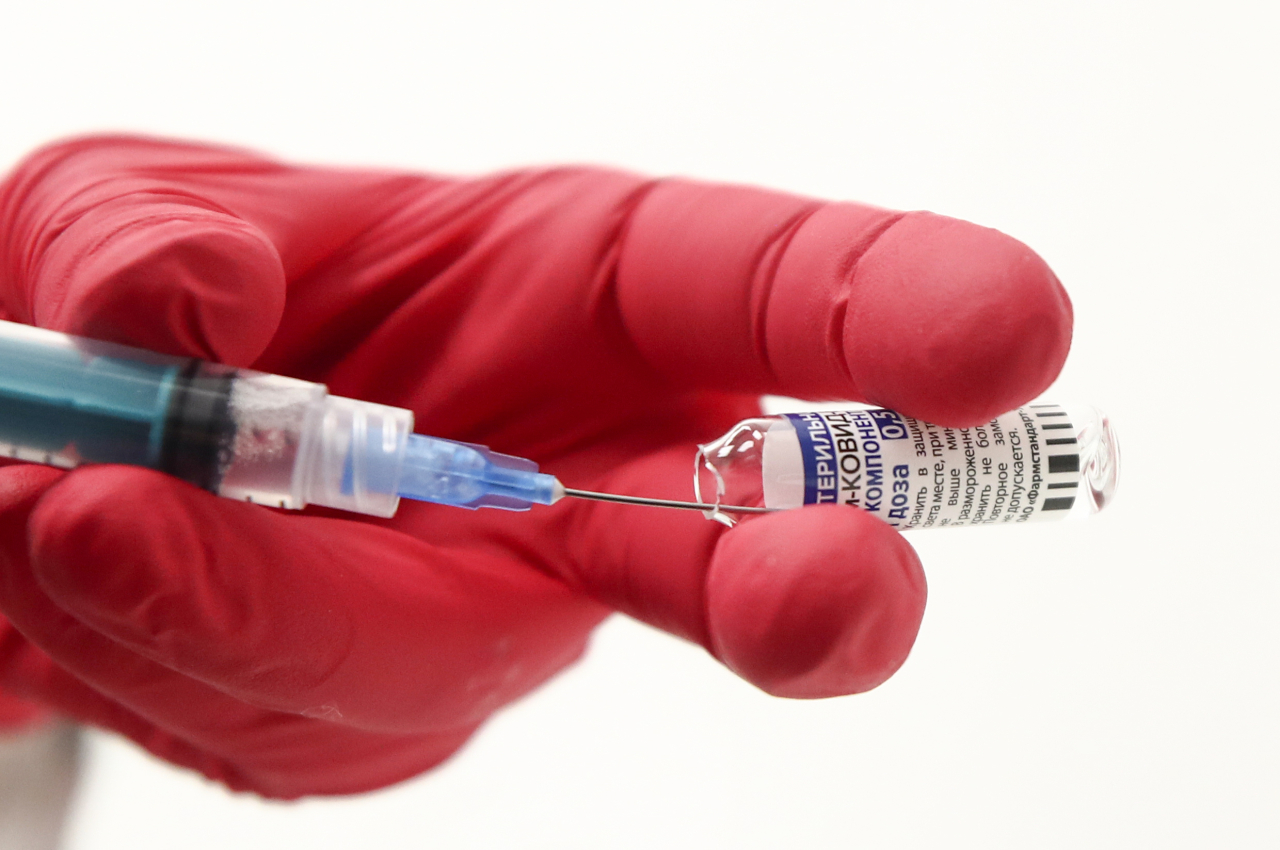 |
A medical worker is drawing up a dose of the Gam-COVID-Vac, or Sputnik V vaccine, into a syringe. (Valery Sharifulin-Yonhap) |
Faced with a COVID-19 vaccine shortage, South Korea is taking the first steps to consider Russia’s Sputnik V.
The Ministry of Food and Drug Safety said Thursday that it would collect clinical data on the Russian vaccine to study its efficacy and safety. The ministry has requested the help of the Foreign Ministry and its overseas missions for the collection of data from 12 countries where the vaccine has been rolled out, officials said.
A Drug Ministry official, however, attempted to draw a line.
“The measure is part of our information-gathering activity on foreign-developed vaccines and their reported side effects and is not something to do with its possible introduction or approval for use here.”
Russia has made no move to obtain local use approval here, the official said.
The ministry’s action came a day after President Moon Jae-in directed the Cabinet to start looking into the Russian jabs, amid growing concern that a shortage of doses could thwart the country’s goal of achieving herd immunity by November.
Currently, the vaccines available here are those from Pfizer and AstraZeneca. Korea has inoculated just 2 million of its 52 million population so far.
Russia’s Sputnik V COVID-19 vaccine uses broadly similar vaccine technology as those developed by AstraZeneca and Johnson & Johnson’s Janssen, known as adenoviral vectors. It has received approval in around 60 countries to date, but not in the US or Europe.
At least two Korean firms are to contract-manufacture the vaccine.
Hankook Korus, a subsidiary of local biotech firm GL Rapha, is to begin producing the drug in May, with all doses bound for export, according to industry sources. It will first manufacture 150 million doses.
Another 500 million doses will be manufactured in accordance with an agreement between a GL Rapha-led consortium, which also includes eight leading pharmaceutical companies and Russian sovereign wealth fund the Russian Direct Investment Fund.
Another local firm, Huons Global, is set to begin pilot production of the Russian vaccine in August.
Meanwhile, the Korean government said it would stick to its initial plan to finish inoculating 36 million people here with 72 million doses by November.
Its initial vaccine supply plan includes enough AstraZeneca vaccine for 10 million people, Pfizer vaccine for 13 million people, Janssen vaccine for 6 million people, Moderna vaccine for 20 million people and Novavax vaccine for 20 million people. On top of that, Korea also has an agreement with the World Health Organization’s COVAX project, from which it is to receive enough vaccines for 10 million people.
The road map, however, faces growing uncertainty as no specific schedule has been set yet for bringing in the doses from Moderna or Novavax.
Finance Minister Hong Nam-ki, who concurrently serves as deputy prime minister for economic affairs, said this week that the government would be able to receive the Moderna vaccine during the second half of the year, not in the first half as President Moon earlier said, as Moderna plans to supply 200 million doses to the US first.
By Shim Woo-hyun (
ws@heraldcorp.com)





![[Exclusive] Hyundai Mobis eyes closer ties with BYD](http://res.heraldm.com/phpwas/restmb_idxmake.php?idx=644&simg=/content/image/2024/11/25/20241125050044_0.jpg)
![[Herald Review] 'Gangnam B-Side' combines social realism with masterful suspense, performance](http://res.heraldm.com/phpwas/restmb_idxmake.php?idx=644&simg=/content/image/2024/11/25/20241125050072_0.jpg)

